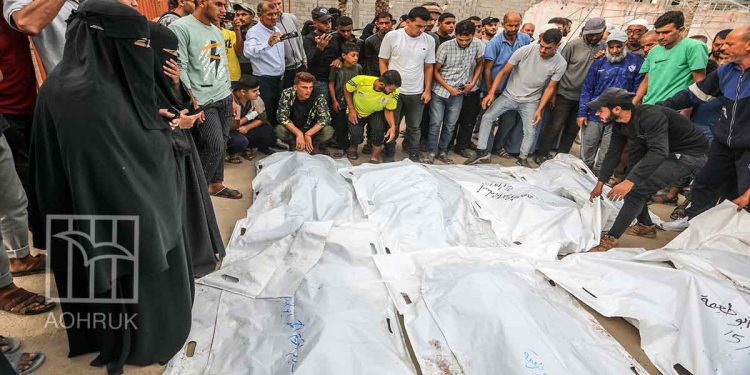Day after day, the tragedy in Gaza worsens due to the ongoing Israeli bombardment and massacres against innocent civilians, amid international silence and a clear inability to stop the war of extermination.
The death toll and the numbers of the wounded, most of whom are women and children, increases, while the Strip suffers from an unprecedented humanitarian disaster under a tight siege that prevents the arrival of the most basic necessities of life.
Two new massacres
In the early hours of Thursday, the Gaza Strip witnessed two massacres resulting in the killing of 69 Palestinians, including women and children, and the injury of dozens.
The Israeli bombardment targeted a crowded residential area near a hospital in the northern Gaza Strip, where dozens of homes were razed to the ground, while others were severely damaged.
In light of the scarcity of resources; medical crews and residents used primitive tools to rescue the injured and pull the dead from under the rubble.
In the middle of the Strip; The occupation bombs targeted a house in one of the densely populated camps, killing three women, while the Israeli artillery continued to target the areas surrounding the town.
This aggression is part of a systematic Israeli policy aimed at forcibly displacing the population and turning the area into a “buffer zone”.
Who will stop the massacres?
On the international level; the United States used its veto to prevent the passage of a resolution calling for an immediate ceasefire in the Security Council.
The US position confirms Washington’s continued support for the Israeli occupation, which encourages it to continue its war of extermination without any deterrent.
The current catastrophic reality raises questions on who would have the power to stop these daily massacres. Would the international community move to impose an immediate ceasefire? Or would it remain submissive to political interests that deepen the suffering of the Palestinians?
The continuation of the massacres in Gaza reflects the inability of the international system to protect civilians or carry out its moral and humanitarian role, and raises profound questions about the future of justice and humanity in a world dominated by interests.



























